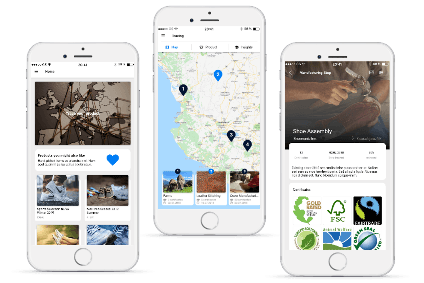
Adopting blockchain technology will make integration of end-to-end traceability faster and easier for companies, according to a group of denim brands speaking at the recent Kingpins Transformers Foundation digital event.
Jordan Nodarse of denim brand Boyish Jeans, Tony Tonnaer of Kings of Indigo and Anna Foster of E.L.V Denim spoke on the Visionary Brands’ Panel with moderator Ani Wells of Simply Suzette, as part of the organisation’s Catalysts summit — its first as a non-profit entity.
Wells asked the three about their efforts around sustainability and what their thoughts were on adopting blockchain technologies as an enabler for traceability.
Foster said depending on the size of the business, blockchain adoption would be embraced differently.
“My supply chain is literally five steps,” she said, adding her fabrics are laundered and up-cycled into new denim items at facilities within a five-mile radius.
“I can sit down and have cups of tea with every person I work with. For me, the priority is around social responsibility as well as environmental.

US Tariffs are shifting - will you react or anticipate?
Don’t let policy changes catch you off guard. Stay proactive with real-time data and expert analysis.
By GlobalData“We can spend so much time on creating reports and investing in the blockchain, in trying to make the right decisions for the environment. If I were to invest all my time in blockchain, it would take away from the personal touch of working directly with my suppliers, working closely with the people whose opinion I value in making my product and who can guide me on how to work with a previously used item.
“Currently my time is better spent doing that until I’m big enough to invest back in blockchain for my business.”
Nodarse, however, said in small businesses, it is difficult to “do sustainability” when you are “just one person”.
“With blockchain, it meant handing over the reins to a company that can do it; that makes less work for me.”
He has engaged Retraced, which helped him with supply chain mapping. Retraced’s solution collects supply chain information from the client and makes it available for the end-consumer – connecting shoppers with the makers of fashion and offering insights into the production process and raw materials.
“I realised the most important thing was being able to map my supply chain to be able to show my consumers. That’s something we are working on now. I think it is going to be great. It’s a one-stop-shop that shows where things are coming from, what it all means and how I can understand it better.”
Tonnaer added one of the biggest things he finds with paperwork and certifications is the prevalence of fraud.
“One way to get around that, and I believe it is a big part of our future, is technology. That is technology in sales, production and marketing. I think blockchain is a part of it for sure as it provides proof of goings-on in your supply chain.”
All three agreed with any type of technological integration that mapped the supply chain, the message needed to be translated into an easy-to-understand format for consumers.
“It needs to be translated into very simple terms. There’s no point adding lots of technical terminologies, it needs to be an enabler for the consumer to decide between your product and another. They are our judge and jury,” said Foster.
Tonnaer agreed: “It needs to be translated into very simple, decision-making ratings that allow you to separate the best from the rest: Who is just making claims without being able to back them up? Who can verify their claims?”
In February, denim conference Kingpins Transformers transitioned into Transformers Foundation, a non-profit entity focused on actively addressing and facilitating change in key areas of the denim supply chain. It sees the Foundation focus on social responsibility, sustainable cotton, responsible chemical management and consumer education.
Earlier, a panel session conceded the success of transparency and traceability within the clothing industry relies on each part of the supply chain sharing a common goal, and urged brands and manufacturers to seek out like-minded partners.




